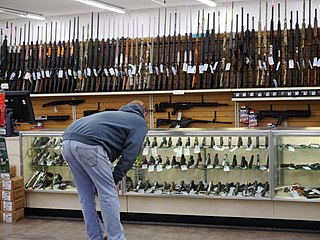Related Research Articles

Gun control, or firearms regulation, is the set of laws or policies that regulate the manufacture, sale, transfer, possession, modification, or use of firearms by civilians.

Gun politics is defined in the United States by two primary opposing ideologies about civilian gun ownership. Those who advocate for gun control support increased regulation of gun ownership; those who advocate for gun rights oppose increased restriction of gun ownership. These groups often disagree on the interpretation of laws and court cases related to firearms and of the effectiveness of firearms regulation on crime and public safety. There is also a well-known gender gap when it comes to gun control, and many argue that a possible explanation for this is authoritarianism. It was estimated, in 2018, that U.S. civilians own 393 million firearms, and that 40% to 42% of the households in the country have at least one gun. However, record gun sales followed in the following years. The U.S. has by far the highest estimated number of guns per capita in the world, at 120.5 guns for every 100 people.

Gun violence results in tens of thousands of deaths and injuries annually in the United States. By 2022, gun violence was responsible for about 100 daily fatalities and hundreds of daily injuries. In 2018, the most recent year for which data are available as of 2021, the Centers for Disease Control and Prevention's (CDC) National Center for Health Statistics reports 38,390 deaths by firearm, of which 24,432 were by suicide. The rate of firearm deaths per 100,000 people rose from 10.3 per 100,000 in 1999 to 12 per 100,000 in 2017, with 109 people dying per day or about 14,542 homicides in total, being 11.9 per 100,000 in 2018. In 2010, there were 19,392 firearm-related suicides, and 11,078 firearm-related homicides in the U.S. In 2010, 358 murders were reported involving a rifle while 6,009 were reported involving a handgun; another 1,939 were reported with an unspecified type of firearm. In 2011, a total of 478,400 fatal and nonfatal violent crimes were committed with a firearm. Gun crimes are covered by 18 USC 922 and 18 USC 924, which are the principal federal firearm statutes.

Gun-related violence is violence committed with the use of a firearm. Gun-related violence may or may not be considered criminal. Criminal violence includes homicide, assault with a deadly weapon, and suicide, or attempted suicide, depending on jurisdiction. Non-criminal violence includes accidental or unintentional injury and death. Also generally included in gun violence statistics are military or para-military activities.

In 2018, the Small Arms Survey reported that there are over one billion small arms distributed globally, of which 857 million are in civilian hands. The survey stated that American civilians account for an estimated 393 million of the worldwide total of civilian held firearms, or about 120.5 firearms for every 100 American residents.

David Hemenway is a Professor of Health Policy at the Harvard School of Public Health. He has a B.A. (1966) and Ph.D. (1974) from Harvard University in economics. He is the director of the Harvard Injury Control Research Center and the Harvard Youth Violence Prevention Center. He is also currently a James Marsh Visiting Professor-at-Large at the University of Vermont. Hemenway has written over 130 articles and five books in the fields of economics and public health.

A mass shooting is a crime in which an attacker kills or injures multiple individuals simultaneously using a firearm. There is no widely-accepted definition of "mass shooting" and different organizations tracking such incidents use different definitions. Definitions of mass shootings exclude warfare and sometimes exclude instances of gang violence, armed robberies, and familicides.

Defensive gun use (DGU) is the use or presentation of a firearm for self-defense, defense of others or, in some cases, protecting property. The frequency of incidents involving DGU and their effectiveness in providing safety and reducing crime are controversial issues in gun politics and criminology, chiefly in the United States. Different authors and studies employ different criteria for what constitutes a defensive gun use which leads to controversy in comparing statistical results. Perceptions of defensive gun use are recurring themes in discussions over gun rights, gun control, armed police, open and concealed carry of firearms.

Proposals for universal background checks would require almost all firearms transactions in the United States to be recorded and go through the National Instant Criminal Background Check System (NICS), closing what is sometimes called the private sale exemption. Universal background checks are not required by U.S. federal law, but at least 22 states and the District of Columbia currently require background checks for at least some private sales of firearms.
Garen J. Wintemute is an emergency medicine physician at UC Davis Medical Center, in the US state of California, where he is the director of the Violence Prevention Research Program. He conducts research in the fields of injury epidemiology and the prevention of firearm violence. He has been named a "hero of medicine" by Time magazine. He is the director of the University of California Firearm Violence Research Center, which was established in 2017; the center is the first state-funded gun violence research center in the country.
Michael B. Siegel is an American tobacco control researcher and public health researcher. He is a professor of community health sciences at the Boston University School of Public Health.

Michelle Ann Williams is a Jamaican-American epidemiologist, public health scientist, and educator who has served as the dean of the Harvard T. H. Chan School of Public Health since 2016.
The Dickey Amendment is a provision first inserted as a rider into the 1997 omnibus spending bill of the United States federal government that mandated that "none of the funds made available for injury prevention and control at the Centers for Disease Control and Prevention (CDC) may be used to advocate or promote gun control." In the same spending bill, Congress earmarked $2.6 million from the CDC's budget, the exact amount that had previously been allocated to the agency for firearms research the previous year, for traumatic brain injury-related research.
A child access prevention law makes it illegal for an adult to keep a gun in a place and manner so that a child can easily access and fire it. Proponents of these laws, such as the Law Center to Prevent Gun Violence in the United States, argue that they are effective at reducing accidental gun deaths among children, since they reduce accessibility and thereby risk. The National Rifle Association of America has lobbied against such laws, arguing that they are ineffective and infringe on the rights of gun owners to protect their homes.

Mass shootings are incidents involving multiple victims of firearm-related violence. Definitions vary, with no single, broadly accepted definition. One definition is an act of public firearm violence—excluding gang killings, domestic violence, or terrorist acts sponsored by an organization—in which a shooter kills at least four victims. Using this definition, one study found that nearly one-third of the world's public mass shootings between 1966 and 2012 occurred in the United States, The New York Times recorded the same total of mass shootings for that span of years. Using a similar definition, The Washington Post recorded 163 mass shootings in the United States between 1967 and June 2019. Mother Jones recorded 140 mass shootings between 1982 and February 2023. The Associated Press recorded 59 mass shootings between 2006 and August 2022. The Violence Project of the National Institute of Justice recorded 185 mass shootings from 1966 to December 2022. The Federal Bureau of Investigation designated 61 events as active shooter incidents in 2021.

Public opinion on gun control in the United States has been tracked by numerous public opinion organizations and newspapers for more than 20 years. There have also been major gun policies that affected American opinion in the 1990s. Throughout these polling years there are different gun control proposals that show promise for bipartisan action. Over the years listed there have been mass shootings, most notably school shootings, that have affected public opinion. There have also been a growth in states around the United States taking more drastic measures on gun control.
Matthew Jason Miller is an American physician and epidemiologist. He is an adjunct professor of epidemiology at the Harvard School of Public Health, where is also the co-director of the Harvard Injury Control Research Center. He is also a professor of health sciences and epidemiology at Northeastern University. He is board certified in internal medicine and medical oncology. He is known for his research into injury and violence prevention.
The Harvard Injury Control Research Center is a research center at the Harvard T.H. Chan School of Public Health dedicated to studying injury prevention. In November 2016, the Center received a grant of over $650,000 from the National Institute of Justice to study police shootings. This was one of the few grants that the federal government has given to study gun violence in the last two decades.
In the United States, use of deadly force by police has been a high-profile and contentious issue. In 2022, 1,096 people were killed by police shootings according to The Washington Post, while according to the "Mapping Police Violence" project, 1,176 people were killed by police in total.
Renee M. Johnson is an American scientist specializing in the mental health of adolescents and young adults. She researches substance abuse, substance use epidemiology, and violence in marginalized youth including persons of color, LGBTQ, and immigrants. Johnson is an associate professor in the Johns Hopkins Bloomberg School of Public Health.
References
- ↑ "Deborah Azrael Faculty Page". Harvard School of Public Health. 27 August 2012.
- ↑ Healy, Beth (2016-06-16). "Treasurer says pension fund can't divest its gun stocks without legislative action". The Boston Globe.
- ↑ "Deborah Azrael". Researcher Directory. Harvard School of Public Health. 5 January 2021.
- ↑ Goode, Erica (2013-04-02). "Report Links High Rates of Gun Violence to Weak State Regulations". The New York Times.
- ↑ Rocheleau, Matt (2016-09-21). "3 percent of US adults own half the country's guns, study says". The Boston Globe.
- ↑ Beckett, Lois (2016-09-19). "Gun inequality: US study charts rise of hardcore super owners". The Guardian.
- ↑ Morgan, Jared (2015-10-22). "Unreleased Harvard study backs claim 40 percent gun transfers unchecked". Guns.com.
- ↑ McDonough, Katie (2015-02-24). ""Where there are more guns, more women die": A Harvard public health expert breaks down the data on firearms and women's safety". Salon.
- ↑ Gass, Henry (2015-12-14). "2015 US mass shootings: 'The sky is not falling'". Christian Science Monitor.
- ↑ "Obituary: Jeremy R. Azrael Was Convener of Leaders Who Shaped Post-Communist Russian Economy". RAND Corporation. 2009-03-20.